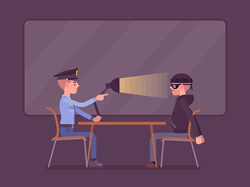Ed Cara* says new research suggests using a virtual avatar instead of a police officer to interview eyewitnesses to a crime could improve the accuracy of recollections.

Image: Andrew_Rybalko
As many a crime documentary has made clear, eyewitness testimony is often much less accurate than you might think.
But a new study published recently in Frontiers in Psychology suggests there could be a relatively simple way to improve witness recollections: Have a virtual avatar do the interviewing instead of a cop.
Researchers at the University of Westminster, London, recruited 38 adult volunteers, 26 of whom were women, for their study.
The subjects watched a video of a (staged) car theft, then were asked to return two days later.
On the second visit, they were interviewed about the incident in one of two ways.
They either had a face-to-face interview with a research assistant in an nondescript room, or wore a virtual reality headset (the Oculus Rift) that placed them in a stimulation of that same room, where they were interviewed by a humanoid avatar.
Both groups were asked the same series of questions used by UK law enforcement when investigating a crime.
The first part of the interview had the volunteers detail whatever they remembered about the crime, known as a free-recall task.
Both groups were about as accurate as the other in this phase.
But the virtual group was about 60 per cent better at the second part of the interview, when they were asked specific questions about the crime.
The virtual group got an average of 37 details correct (such as what colour jacket the thief was wearing), while the face-to-face group got an average of 30 details correct.
The virtual group also provided fewer inaccurate details, as well as less conflated information (e.g., a false memory of something that never happened).
“These novel findings, and our pattern of retrieval results indicates the potential of avatar-to-avatar communication in virtual environments,” the authors wrote.
The study is only meant to be a proof-of-concept experiment.
But according to Julia Shaw, a psychologist at University College London who specialises in memory, the findings make perfect sense given how memory works.
“Unlike when we interact with technology, when we speak to humans we constantly manage the impression we are making — controlling how we move, speak, what we say,” Shaw, who was not involved in the new study, told Gizmodo.
“This has two effects.”
“First, it takes a lot of effort, effort that could otherwise be used for remembering what happened.”
“Second, the nature of a social interaction can affect how and what we remember.”
“A particularly attractive or friendly interviewer may encourage you to mention more details than you are sure you remember, while a judgmental or distracted interviewer may make you keep your responses too short.”
In surveys taken afterward, the volunteers who were interviewed by the avatar did report having an easier time talking and, importantly, that they were more comfortable admitting when they didn’t remember something.
They were also less confident that their memories were correct than the face-to-face group, which at first glance might seem counterproductive.
But research has consistently shown that not only is confidence not a reliable predictor of memory accuracy, but that inaccurate eyewitnesses tend to be more confident than those who get things right, especially if their recollections are influenced by other factors, such as suggestive police questioning or even hypnosis.
With their encouraging results in hand, the researchers plan to conduct more trials of this interviewing technique.
“Virtual environments allow interviews to be conducted quickly and remotely — and, our research suggests, more effectively,” said study author Coral Dando.
“It would be nice if our research program starts a conversation about the real possibilities for remote, yet effective, witness interviewing.”
* Ed Cara is a science writer based in New York. He tweets at @EdCara4.
This article first appeared at www.gizmodo.com.au.










